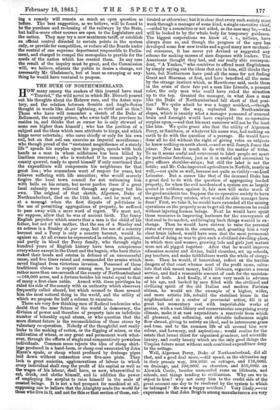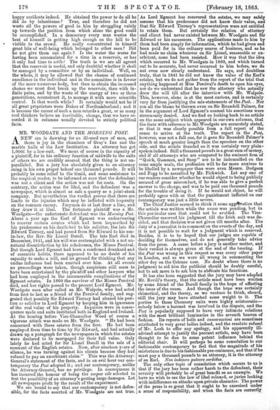THE DUKE OF NORTHUMBERLAND.
HOW many among the readers of this journal have read " Tancred," the wild novel in which Mr. Disraeli poured out his thoughts about the Hebrew race, and the Asian mys- tery, and the relation between Semitic and Anglo-Saxon thought in words like sheet lightning, so vivid and so thin ? Those who have will remember a ;ketch of the Duke of Bellamont, the county prince, who owns half the province he resides in, and thinks that as owner he is only steward of some one higher than himself ; who has the position of a subject and the ideas which men attribute to kings, and which kings never entertain ; who cares chiefly or only for his own soil, but on that soil can exercise an imperial munificence ; who though proud of the " sustained magnificence of a stately life " spends his surplus upon his people, spends with both hands as a man in whom selfishness has been killed by limitless resources ; who is wretched if he cannot pacify a county quarrel, ready to spend himself if only convinced that the expenditure will compensate his neighbours for that great loss • who remembers want of respect for years, but relieves suffering with life annuities ; who would scarcely forgive the local town council for not welcoming him with bells on his return, but never pardon them if a great local calamity were relieved through any agency but his own. The original of that sketch, Algernon, Duke of Northumberland, died on the 12th inst., and he must not, at a momeit when the first dispute of politicians is the use of permitting aggregations of property, be suffered to pass away with a mere word of regret. We must not, we suppose, allow that he was of ancient birth. The funny English prejudice which asserts that a man is the child of his father, but not of his mother, that the son of a Stanley and an actress is a Stanley de pur sang, but the son of a country baronet and a Percy is only a country baronet, would be against us. At all events he represented in estates, in position, and partly in blood the Percy family, who through eight hundred years of English history have been conspicuous everywhere except in the Court and the bagnio, who have thrice staked their heads and estates in defence of an unsuccessful cause, and five times raised and commanded the armies which saved England from victorious invasion. Possessed of those traditional claims to respect among men, he possessed also rather more than one-seventh of the county of Northumberland —168,000 acres, and a fortune besides his rental equal to that of many a first-class noble. Armed with these privileges he ruled his side of the county with an authority which observers frequently called absurd, but which seemed to those around him the most natural thing in the world, and the utility of which we propose for half a column to examine.
There are very few thinkinc, men of Radical tendencies who doubt that the near future of the world is democracy, the division of power and therefore of property into an indefinite number of tolerably equal atoms, or who question that the more distant future is the reconsolidation of those atoms by voluntary co-operation. Nobody of the thoughtful sort really looks to the making of cotton, or the digging of mines, or the cultivation of wheat, or any great and permanent work what- ever, through the efforts of single and comparatively powerless individuals. Common sense rejects the idea of cheap shirt- ings produced in a hand-loom, or cheap coal excavated by John Hurst's spade, or cheap wheat produced by drainage pipes laid down without connection over five-acre plots. They look to great societies, agglomerations of labour in which every individual shall reap the profit of his capital as well as the wages of his labour, shall have, as now, wherewithal to eat, drink, and clothe himself, and in addition the power of employing the surplus to raise himself in the scale of created beings. It is not a bad prospect for mankind at all, supposing one to believe that the Almighty made the world for those who live in it, and not for this or that section of them, mil- tinted or otherwise; but it is clear that every such society must work through a manager of some kind, a single executive chief, —aided by a committee or not aided, as the case may be,—who will be looked to by the whole body for temporary guidance. The biggest corporations we know of, 1. e., nations, have always done so, and though the progress of the ages has developed some few new truths and a good many new mechani- cal resources, it has never yet devised or suggested any scheme for making masses of men dispense with leaders. The Americans thought they had, and our really able correspon- dent, " A Yankee," who contrives to offend most Englishmen by simply saying out the ideas that are in him, still thinks they have, but Northerners have paid all the same for not finding Grant and Sherman at first, and have benefited all the same by the strange instinct which, as Hawthorne said, made them in the crisis of their fate put a man like Lincoln, a peasant ruler, the only man who could have ruled the situation up to the top. Granted the manager, in what does a man like the Duke of Northumberland fall short of that posi- tion? We quite admit he was a happy accident,—though his father, by the way, replanted the Northumbrian slopes, which is exactly what a manager possessed of unusual brain and foresight would have employed the co-operative surplus upon,—and that his next successor will not be the least like him. We quite grant also that the utility of Algernon Percy, or Smithson, or whatever his name was, had nothing on earth to do with the question of a peerage. He would have done all he did without the right of giving votes on subjects he knew nothing on earth about,—and so will Joseph Jones the joiner. Nor has it much to do with the matter of titles. To us it seems useful and convenient to label people set apart for particular functions, just as it is useful and convenient to give officers shoulder-straps ; but still the label is not the bottle; and Mr. Coke improved agriculture in Norfolk, nearly as well,—not quite as well, because not quite as visibly—as Lord Leicester. But a career like that of the deceased Duke has a great deal to do with the question of aggregating landed property, for when the evil accidents of a system are so largely quoted in evidence against it, fair men will make much of the good accidents too. Suppose the co-operative society to have managed the Percy estates, what would its able manager have done? First, we take it, he would have extended all the mining operations on the property so as to get all the resources he could without injuring human beings. Next he would have spent those resources in improving harbours for the conveyance of that coal to its market, and bringing back things wanted in ex- change. Then he would have striven to raise the personal status of every man in the concern, and, granting him a very clear brain indeed, would have seen that the most permanent method of doing so was to give each a civilized dwelling place, in which men and women, growing lads and girls just mature were not all pigged together. After that he would improve education secular and divine, build churches, set up schools, pay teachers, and make faithfulness worth the while of clergy- men. Then be would, if benevolent, reflect on the terrible dangers of that coast whence most of the profit came, calcu- late that risk meant money, build lifeboats, organize a rescue service, and find a reasonable amount of cash for the mainten- ance of both. And finally, if a man very much in advance of his age, and backed by men filled with the civilized and civilizing spirit of the old Italian and modern Parisian citizen, he would set the example of a higher, wider, and more artistic life, rebuild the stateliest house in the neighbourhood as a centre of provincial action, fill it at great but momentary cost with imperishable works of genius, with a vast library and conservatories comprising every climate, make it at vast expenditure a reservoir from which all pleasant, and softening, and chivalric influences might flow abroad, giving to society an ideal, and to intercourse grace
and tone, and to the common life of all around him new colour, and harmony, and aspirations ; would realize for the estate that latent thirst for organized grandeur, and scientific luxury, and costly beauty which are the only good things the Utopian future must without such combined expenditure deny to the cottage. Well, Algernon Percy, Duke of Northumberland, did all that, and a good deal more,—did spend, as the obituaries say in their prosaic way, 308,000/. on cottages, and 176,0001. on drainage, and 100,000/. on churches, and 250,000/. on Alnwick Castle, besides unrecorded sums on lifeboats, and schools, and things tending to civilization. Why are we to object to him ? why not carry him to the credit side of the great account one day to be rendered by the system to which he belonged ? He was a happy accident ? Very likely,—our experience is that John Brights among manufacturers are very happy accidents indeed. He obtained the power to do all he did do by inheritance ? True, and therefore he did not waste all the powers of good in him by struggling vainly up towards the position from which alone the good could be accomplished. In a democracy every man wastes the best of himself in getting high enough on the hill to be visible to the crowd. He really concentrated in himself great bits of well-being which belonged to other men? Did he not give them out again ? Is the water the worse for having been accumulated for a time in a reservoir, or has it only had time to settle? The truth is we are all agreed that the reservoir is useful, and only doubtful whether it shall be managed by a committee or by an individual. Well, on the whole, it may be allowed that the chance of continued excellence in the individual and in the committee is in favour of the more numerous body, but then to obtain the increased chance we must first break up the reservoir, then with in- finite pains, and by the waste of the energy of two or three generations, reconstruct it, to manage it with more scientific control. Is that worth while ? It certainly would not be if all great proprietors were Dukes of Northumberland ; and it is because the career of such a man retards a great, or as many cool thinkers believe an inevitable, change, that we have re- corded it in columns usually devoted to strictly political facts.































 Previous page
Previous page